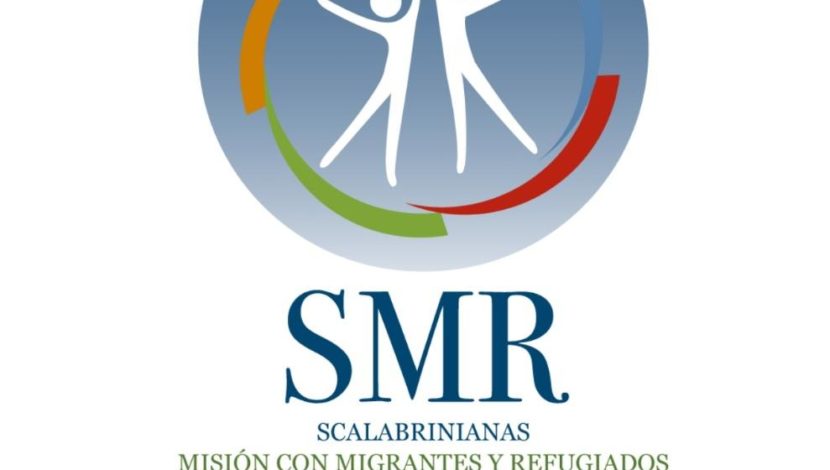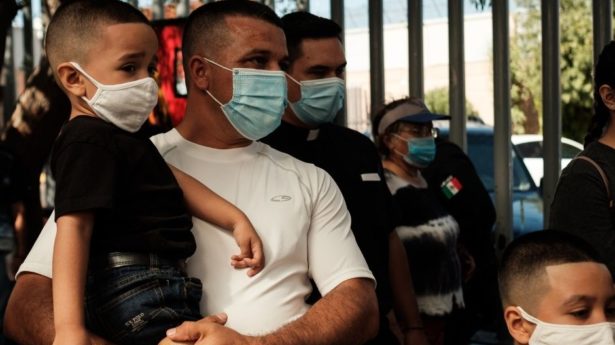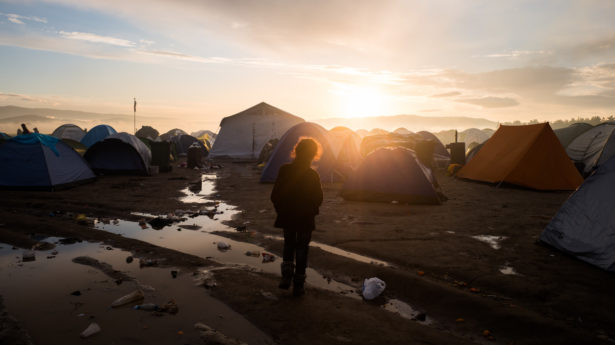The Unitarian Universalist Service Committee advances human rights through grassroots collaborations.
Solidarity in the Times of COVID: Scalabrinianas Misión con Migrantes y Refugiados

By on March 2, 2021
What are SMR’s normal activities and what services are provided in Casa Mambré? Before March of last year and before the pandemic, what was your work like and what were the most significant difficulties or challenges at that time? Were there other events or situations that you were responding to then?
Prior to the pandemic, in addition to legal accompaniment, Casa Mambré provided accommodations, food, comprehensive physical and mental health services as well as opportunities for continuing education and certifications. With the support of our volunteers, we provided workshops in handcrafts, sports, and training in different areas and recreational activities. Residents could also attend yoga, art, dance and sports classes free of charge in schools run by civil society organizations.
Unfortunately, with the pandemic, all external activities were cancelled. Continuing education programs and certifications remain suspended to this day because the government institutions that run them are not open and working. Due to public health regulations, no one can leave the house to work; before the pandemic, many were working and only came to Casa Mambré to sleep and eat.
Since early 2019, due to the migrant caravans, government institutions such as COMAR (the Mexican Commission for Refugee Assistance) and Immigration have been overwhelmed with cases. Processes that should have only taken between 45 days to two months began to last 3 to 4 months. The pandemic caused these processes to move even more slowly, increasing the amount of time that people needed to stay in Casa Mambré from three months to six, seven, or even nine months.
Once it became clear that the pandemic had arrived and how serious the situation was, what were SMR-Casa Mambré’s immediate responses? What was the atmosphere in the house like those first few days and weeks? How did the people who were staying there react? How did the volunteers and staff feel?
Since March 2020 at the outset of the emergency, we had to implement a sanitary safety protocol which meant not receiving volunteers or any kind of visitors. For several months, all staff worked from home and the key services provided by Casa Mambré were left in the hands of the three [SMR] nuns. In July, the technical team started working partially in person and to date, some are still working 100 percent from home while others are working half time at home and half in person.
The impact on residents of Casa Mambré continues to be significant: Since they can only leave to attend to their migration paperwork or receive medical assistance, they suffer from additional stress and anxiety. Likewise, their constant concern for family members that remain in their home countries—which is even greater for those in countries affected by the Eta and Iota hurricanes—has caused despair and provoked emotional crises because they are unable to send money to help their families.
The psychosomatic consequences are clear: frequent headaches, poor digestion, muscle aches, insomnia, appetite changes, aggressiveness, apathy, and sadness.
Those directly responsible for accompaniment in Casa Mambré were faced with the tremendous challenge of having to constantly be alert and attentive to the reactions, conflicts and emotional crises of house residents and intervene to prevent harm from being done. In addition to mental and emotional fatigue, they were physically exhausted from preparing meals, coordinating cleaning, monitoring compliance with healthy and safety protocols, and managing all purchases.
Did the local and national authorities that you have regular contact with provide any kind of support prior to the pandemic? How would you describe these authorities’ responses during this crisis? What types of regulations, restrictions, or other rules have been implemented by authorities in response to the pandemic? How have these affected the population that SMR serves and their daily activities?
At the beginning of the emergency, we had support from public health authorities who came to the house to give talks and attend to those with COVID-like symptoms. But that was only during the first month and they haven’t been back since then.
The Hospital Reconversion Program, which designates specialized hospitals to primarily receive COVID patients, has reduced the number of emergency beds and respirators for those with non-COVID health conditions. In the case of sexual, reproductive, maternal, and neonatal health, David Meléndez Navarro, Secretary of the Committee for the Promotion of Safe Maternity in Mexico, suggested returning to the use of professional midwife services, even though Mexico does not have enough professional midwives to meet the need. There are also not enough of the vaccines that are specifically for pregnant women and newborns. In the case of a refugee family staying in Casa Mambré, they had to purchase vaccines for their newborn daughter because there weren’t any in the public health system. On top of that, many women do not go to the hospital to avoid putting themselves or their child at risk.
Other health emergencies, such as injuries, broken bones, or pain caused by infections are also cared for in a limited way. One of the asylum-seekers in Casa Mambré was taken for emergency care due to intense stomach pain, the cause of which was unknown. Three public hospitals denied him care because they were exclusively for COVID patients, and only after three hours did a fourth hospital finally admit him.
Care was limited in psychiatric hospitals and those specializing in physical rehabilitation, so while those with resources pay for private care, those without wait a long time to receive assistance. Because of this, many migrants and refugees are not receiving this kind of specific medical care.
Public health restrictions, particularly the temporary closure of stores and the prohibition of open-air markets has caused unemployment and limited the income of those who work in the informal sector. Many people who are refugees or seeking asylum have lost their source of income and do not have money to pay rent or buy food, medicines, and other essential items.
In part two of the series, SMR staff discuss public health services in Mexico, how they’ve adapted to the pandemic, and what life is like for other charitable organizations in the country.
***
About UUSC: Guided by the belief that all people have inherent worth and dignity, UUSC advances human rights globally by partnering with affected communities who are confronting injustice, mobilizing to challenge oppressive systems, and inspiring and sustaining spiritually grounded activism for justice. We invite you to join us in this journey toward realizing a better future!
Image Credit: Scalabrinianas Misión con Migrantes y Refugiados

